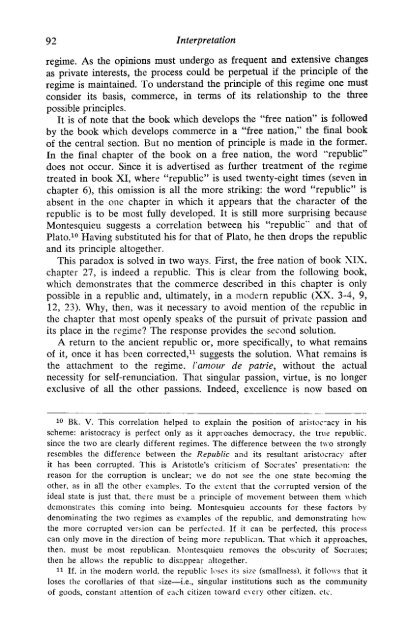philosophy - Interpretation
philosophy - Interpretation
philosophy - Interpretation
Create successful ePaper yourself
Turn your PDF publications into a flip-book with our unique Google optimized e-Paper software.
92 <strong>Interpretation</strong><br />
regime. As the opinions must undergo as frequent and extensive changes<br />
as private interests, the process could be perpetual if the principle of the<br />
regime is maintained. To understand the principle of this regime one must<br />
consider its basis, commerce, in terms of its relationship to the three<br />
possible principles.<br />
It is of note that the book which develops the "free<br />
by the book which develops commerce in a "free<br />
nation"<br />
is foUowed<br />
nation,"<br />
the final book<br />
of the central section. But no mention of principle is made in the former.<br />
In the final chapter of the book on a free nation, the word "repubhc"<br />
does not occur. Since it is advertised as further treatment of the regime<br />
treated in book XI, where "repubhc" is used twenty-eight times (seven in<br />
chapter 6), this omission is aU the more striking: the word "repubhc" is<br />
absent in the one chapter in which it appears that the character of the<br />
republic is to be most fuUy developed. It is stUl more surprising because<br />
Montesquieu suggests a correlation between his<br />
"repubhc"<br />
and that of<br />
Plato.10<br />
Having substituted bis for that of Plato, he then drops the repubhc<br />
and its principle altogether.<br />
This paradox is solved in two ways. First, the free nation of book XIX,<br />
chapter 27, is indeed a repubhc. This is clear from the foUowing book,<br />
which demonstrates that the commerce described in this chapter is only<br />
possible in a repubhc and, ultimately, in a modern repubhc (XX, 3-4, 9,<br />
12, 23). Why, then, was it necessary to avoid mention of the republic in<br />
the chapter that most openly<br />
speaks of the pursuit of private passion and<br />
its place in the regime? The response provides the second solution.<br />
A return to the ancient republic or, more specifically, to what remains<br />
of it, once it has been corrected,11 suggests the solution. What remains is<br />
the attachment to the regime, Vamour de patrie, without the actual<br />
necessity for self-renunciation. That singular passion, virtue, is no longer<br />
exclusive of ah the other passions. Indeed, exceUence is now based on<br />
10 Bk. V. This correlation helped to explain the position of aristocracy in his<br />
scheme: aristocracy is perfect only as it approaches democracy, the true republic,<br />
since the two are clearly different regimes. The difference between the two strongly<br />
resembles the difference between the Republic and its resultant aristocracy after<br />
it has been corrupted. This is Aristotle's criticism of Socrates' presentation: the<br />
reason for the corruption is unclear; we do not see the one state becoming the<br />
other, as in all the other examples. To the extent that the corrupted version of the<br />
ideal state is just that, there must be a principle of movement between them which<br />
demonstrates this coming into being. Montesquieu accounts for these factors by<br />
denominating the two regimes as examples of the republic, and demonstrating how<br />
the more corrupted version can be perfected. If it can be perfected, this process<br />
can only move in the direction of being more republican. That which it approaches,<br />
then, must be most republican. Montesquieu removes the obscurity of Socrates;<br />
then he allows the republic to disappear altogether.<br />
11 If, in the modern world, the republic loses its size (smallness), it follows that it<br />
loses the corollaries of that size i.e., singular institutions such as the community<br />
of goods, constant attention of each citizen toward every other citizen, etc.
















